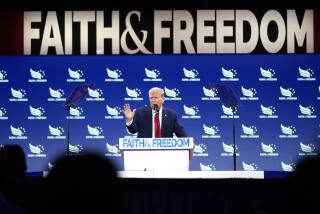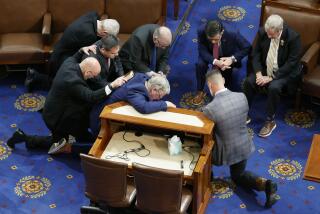Evangelicals Mount Campaign Against Oppression of Christians
- Share via
WASHINGTON — Armed with a long list of people they see as contemporary Christian “martyrs” jailed, tortured and even killed overseas, evangelical church leaders have been prodding the Clinton administration and Congress to act.
The administration is forming an advisory committee on religious freedom to be housed in the State Department and composed of about 20 prominent religious leaders and scholars who will make recommendations to the secretary of state, according to White House officials who requested anonymity.
And the Senate last week unanimously passed a nonbinding resolution condemning “egregious” abuses of “Christians around the world,” and calling on the responsible regimes to stop acts of persecution. The House International Relations Committee last week cleared the way for a similar measure to reach the full House.
Evangelical leaders are seeking to elevate the cause to a national campaign modeled on the Jewish community’s successful efforts in the 1970s and 1980s to free Soviet Jews. More than 100,000 American churches are preparing to mark Sunday as International Day of Prayer for the Persecuted Church.
These church leaders acknowledge that Christians are not the only people victimized for their faith. And they are aware that religious persecution is often inextricably intertwined with nationalism, tribalism and racism.
They also admit that the problem is not new. But they say that until now their community has been largely silent, in part out of fear of jeopardizing missionaries and other Christians spreading the gospel abroad.
“We have to take the lead today because we know from factual evidence piled high that the persecution of Christians as a religious minority worldwide is the most compelling human rights problem today. And we will not be silent about it,” said Richard Cizik, policy analyst for the National Assn. of Evangelicals, which represents more than 10 million people in 47 denominations. He released a “call to action” on the issue in January.
*
A catalog of victimized Christians has been compiled in a report by Freedom House’s Puebla Program on Religious Freedom. It includes these cases:
* In China, the government has jailed more than 200 Catholics and Protestants active in an underground “house-church” movement that may involve as many as 50 million people. Among them is Father Charles Bo Le Guo, 58, a Catholic priest from Shanghai, who was arrested while celebrating Mass on a boat for 250 fishermen in November and was sentenced without trial to two years in a labor camp.
* In Kuwait, Christian convert Robert Hussein was convicted of apostasy by an Islamic court. He went into hiding and recently escaped to the United States with help from a church group.
* In Algeria, seven Trappist monks were taken hostage by the Armed Islamic Group in March and were found dead two months later.
* In Iran, three Protestant church leaders were murdered in 1994 under mysterious circumstances.
“You very seldom read about the persecution of Christians,” said Rep. Frank R. Wolf (R-Va.), who sponsored the House measure. “I think a lot of people felt that with the fall of the Iron Curtain, things would dramatically improve. In some places they have, but in other places, like the Middle East, things have gotten worse.”
The Senate resolution, sponsored by Sen. Don Nickles (R-Okla.) and passed last week, mentions as frequent violators Sudan, Morocco, Saudi Arabia, China, Pakistan, North Korea, Egypt, Laos, Vietnam, Cuba and certain countries in the former Soviet Union.
White House sources say the administration was reluctant to appear to focus on Islamic Middle Eastern nations for oppression of Christians, when regimes of many kinds are persecuting many different religious minorities.
*
Although Christians are most often the targets when the persecution is based solely on religious identity, one White House source said, the advisory committee will be charged with looking at all problems of religious oppression and intolerance.
Given that, the proposed committee includes two Muslims, two Jews, one Bahai and several scholars with expertise in Eastern religions. There are Catholic, Protestant and Orthodox Christians, but only two could be said to represent the evangelical community.
The advisory committee, to be announced “very soon,” another White House official said, is charged with making concrete recommendations in areas such as diplomacy, refugees and using religious leaders to resolve disputes. It will be housed in the State Department’s Office of Democracy and Human Rights and Labor.
The official noted that today’s problems are far more complex and intractable than was the struggle to free the Soviet Jews, who wanted to leave an oppressive country. The challenge now is fundamentally to change the way oppressive countries treat religious minorities.
*
‘One of the problems is that we cannot sit here in Washington and issue edicts and expect that everyone else in the world is going to abide by what we have to say,” the official said. “We have to weave this into our engagement with particular countries and see what we can do to persuade them.”
The offending countries most often target their Christian citizens, while American or European missionaries simply are evicted or briefly detained, said Paul McKaughan, president and chief executive officer of Evangelical Fellowship of Mission Agencies, which represents 100 agencies with 20,000 career missionaries around the world.
“When Christianity was seen primarily as a Western religion, then in a sense nobody was threatened by that,” McKaughan said. “But with the growth of the church around the world, it has threatened people in power. They see their own Christian citizens as a potential bloc for problems.”
More to Read
Sign up for Essential California
The most important California stories and recommendations in your inbox every morning.
You may occasionally receive promotional content from the Los Angeles Times.










